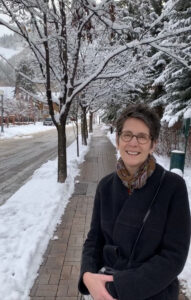Leveling the playing field for women in technology
Leveling the playing field for women in technology
Meet trailblazing Meliora Collective mentor Julie Shapiro ’83
 How did your experience at the University of Rochester influence your life?
How did your experience at the University of Rochester influence your life?
The University of Rochester had an impact on my life even before I was student there. The reason I applied to the University in the first place was because I had received the Bausch and Lomb science award from my high school, which put me in the running for a scholarship there. When I had my admissions interview, my interviewer asked why I wanted to major in biology. I said it was because I want to be a doctor, but in fact, it was not at all clear to me that was really the case. My interviewer pushed me to talk about what I really loved, which, as it turns out, was computer programming. Now remember, it’s 1978, so aside from a very few who had Commodore PETs, personal computers were not a thing, but there was a computer club at my high school which is where I fell in love with programming. By the time I left the interview, we had crossed off biology, and changed my major to electrical engineering (fun fact – at the time the University did not offer undergraduate degrees in computer science). This interview impacted the direction of my life before I even stepped on campus.
The opportunities that followed once I became a student at the University were no less significant. I worked in the lab of Professor Stancampiano, helping to build and test Josephson Junctions. I think that work was instrumental in my receipt of a General Motors scholarship, which gave me the opportunity to spend my summers interning at the Rochester Products division of GM. In my senior year, I joined Professor Voelcker and his team on the development of Constructive Solid Geometry, which became the foundation of many CAD/CAM systems. That research had relationships with both General Motors and McDonnell Douglas (McAuto), and upon graduation, I was able to continue this work at McAuto in sunny southern California. That was the beginning of what would be a thirty plus year career developing software, ultimately running large software development organizations, primarily in the finance/banking industry. I recently retired from UBS (a Swiss bank), where I was a Chief Digital and Information Officer, running a global organization of over 5000 technologists responsible for developing the systems supporting the bank’s Group Functions, which includes areas such as Finance and Treasury, Enterprise Risk Management, Compliance, Data Management, Shared Operations, Legal and HR.
What inspired you to get involved and volunteer?
If I recall correctly, in 1983 when I graduated, I was one of three women graduating with a bachelor of electrical engineering in a class of just under 60. I have navigated working in both a male-dominated profession, as well as male-dominated industries for my entire career. Recognizing the unique challenges this brings, I was very involved in spearheading efforts that created community and opportunities to help level the playing field for women in technology. I am recently retired, and while I look back with pride at the systems that my teams and I built, it is really my legacy of mentoring and being a role model for other women in technology that I am most proud of. And that is why it was such a natural transition for me to join the Meliora Collective mentoring program at the University. I have been on both sides of the mentoring table, sometimes as mentee, sometimes as mentor, and I have reaped great benefits from both! As a mentor, you get the personal satisfaction of knowing that you are supporting your mentees. Beyond that, being a mentor provides the opportunity to meet new people and hear new perspectives and new ideas.
What’s the most rewarding part of staying connected with your alma mater?
Many people ask me what I do with my time now that I am retired. The truth is there is no shortage of things to fill my time with, and like any other point in my life, I get to choose what I want to prioritize. As I settle into retirement, I have found myself drawn to increasing my involvement in alumni volunteer programs, starting with mentoring. It’s been a great opportunity to meet new people and join an incredible community. As much as I hope that my participation benefits the Rochester community, it’s not a selfless act! This volunteer work is incredibly rewarding and I appreciate the benefits it brings to me as well.
What are you looking forward to next?
I am told to be successful in retirement, you have to keep an open mind about what comes next, and I am definitely in exploratory mode. I continue to be passionate about DEI, and am doing a lot of writing on the topic. I am also starting to explore potential opportunities for a role as an advisor or board member, ideally for a small-to-midsize software company in growth mode. I also now have the bandwidth for more engagement with other University volunteer opportunities, and hope to make that a bigger part of my life. But the most surprising and impactful ‘next’ for me has definitely been becoming a grandmother! It’s an experience like no other, and I am incredibly grateful for it.


